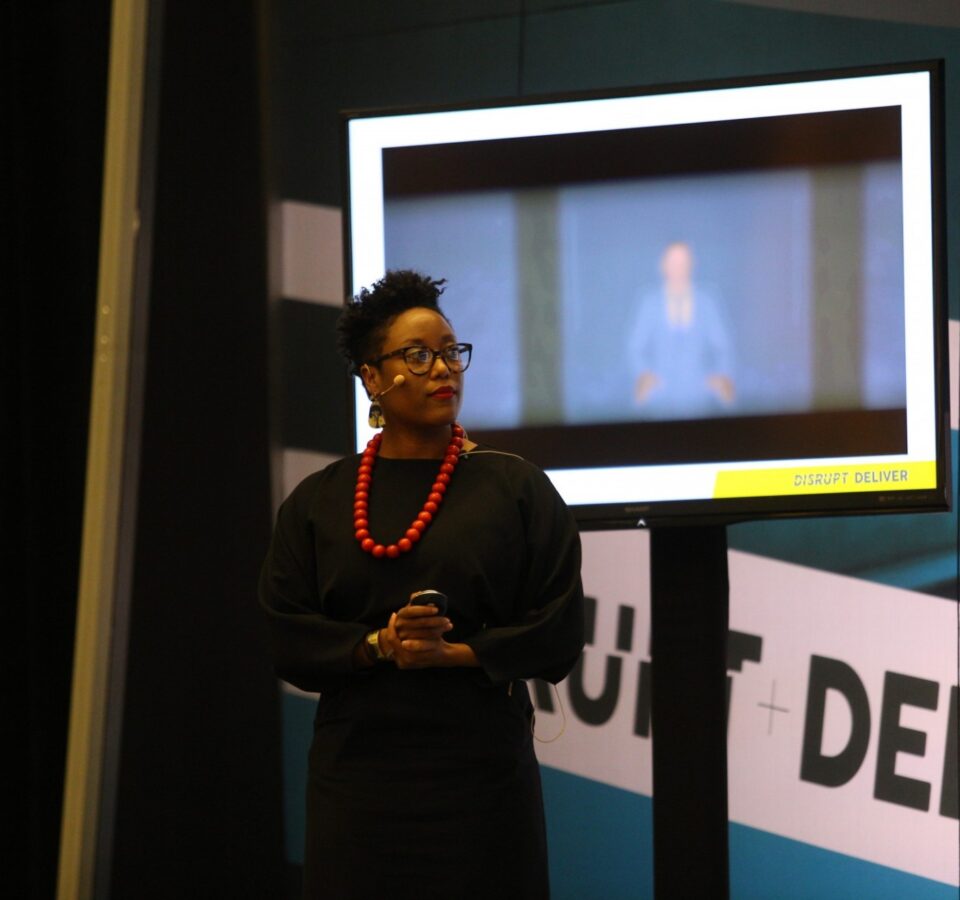Courtney D. Cogburn joins DSI as Associate Director of Diversity, Equity and Inclusion
January 18, 2023

DSI’s new Associate Director of Diversity, Equity and Inclusion, Courtney D. Cogburn, is a multidisciplinary scholar who brings to the role an extensive background at the intersection of technology, psychology, social work, population health and social justice. Cogburn is an Associate Professor of Social Work at Columbia, and the founder and director of the Cogburn Research Group, where she leverages multiple methods and disciplines to improve the characterization and measurement of racism and examine the role of racism in the production of racial inequities in health.
Cogburn has been a core member of DSI since 2016, including serving as co-chair for the Computational Social Science Working Group. At the School of Social Work, Cogburn co-chairs the Justice and Equitable Tech Studio. She is also on the faculty of the Columbia Population Research Center. In addition, Cogburn is involved with the new Climate School, chairing their social systems and justice working group, and is a Co-PI for Learning the Earth with Artificial Intelligence and Physics (LEAP), a new NSF-funded Science and Technology Center at Columbia that leverages AI and data science for climate modeling and predictions.
“What ties my work together is social justice, racial justice, and strategy,” Cogburn observes. “I like thinking about shifting institutes at a high level. What these contributions represent for me is an opportunity to help Columbia become more closely aligned with our stated goals and priorities.”
In her new role at DSI, Cogburn is considering what types of relationships and partnerships would help DSI engage a broader range of people while bettering student recruitment initiatives. “I think that there are some great resource-sharing opportunities we have with other national and international centers,” Cogburn observes. Her strategy includes widening access to participation, research courses, and instructors, with an eye toward undergraduate students interested in continuing education. “Are there ways to substantively involve undergraduates from across the country on research projects at DSI?” Cogburn wonders.
Cogburn also sees an opportunity to highlight the many related research projects at DSI. “Empirically, we know that women and students of color are more likely to be motivated by STEM work that is also socially engaged. The DSI curriculum does not always reflect how engaged our community is in applying data science to socially relevant issues. “It is our job to make it clear to prospective students of what can be accomplished in this space.” Cogburn explains. “There is an opportunity for us to communicate our work in a way that is more attractive to socially-minded students.”
A standout among Cogburn’s many projects is the virtual reality experience 1000 Cut Journey, developed in collaboration with the Virtual Human Interaction Lab at Stanford, which premiered at the Tribeca Film Festival in 2018. In “1000 Cut Journey” participants use VR to experience racism from the perspective of a Black male, Michael Sterling, during early childhood (e.g., through disciplinary action in the classroom), adolescence (e.g., encountering the police), and as a young adult (e.g., experiencing workplace discrimination).

The VR experience is regularly updated and available for download upon request. “I’m particularly interested in how the experience might shift how people analyze the problems of race in society,” Cogburn says. “Do you understand the problem of racism differently? Are you engaging differently? How might something like this be used in an educational context?”
Cogburn’s next VR project involves using the medium to visualize structural racism. “The challenge is to take the data we have on housing inequities or policing inequity and translate that visually in virtual reality in a way that might be supportive of learning and engagement,” she explains. For an early proof of concept, Cogburn and Steven Feiner, a professor of computer science at Columbia, brought together social workers and engineering students to work on visualizing covid infection rates around NYC in virtual reality. A paper describing this work, COVIZ: Visualization of Effects of COVID-19 on New York City Through Socially Impactful Virtual Reality was published by IEEE in 2021.
Another recent project leverages computational data science to investigate how racism manifests in the language, symbols, imagery, and rhetoric used in news and social media. The project, supported by DSI and conducted in conjunction with Colin Leach, Professor of Psychology at Barnard, examines online responses and discourse around specific violent and traumatic events (such as police killings of Black people) and links that data to population mental health. The transdisciplinary approach combines computational and statistical analysis of language use over time with social behavioral theories of emotion and stress. “We are trying to understand how people are moving through different aspects of a single event…No one has ever done this before – a lot of it is gathering the data that we need, and then figuring out how to reliably assess effects over time in these massive data sets,” Cogburn explains.
“You have to bring multiple people to the table who have different kinds of expertise and knowledge to address the complicated problems that we face,” Cogburn asserts. “It’s all hands on deck. And that requires respect for multiple disciplines and types of expertise and knowledge. It requires humility, and it requires clarity about the complex process of bringing multiple, diverse stakeholders and perspectives together. I’m not suggesting that it’s easy – just that it’s necessary,” she concludes.